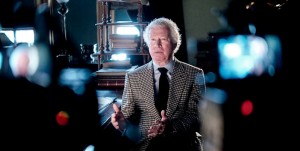OUR MAN IN TEHRAN: 4 STARS
 At the beginning of “Our Man in Tehran” we’re told, “this wasn’t a movie, it was real life.”
At the beginning of “Our Man in Tehran” we’re told, “this wasn’t a movie, it was real life.”
It’s hard not to see that as a jab at Ben Affleck & Company whose film “Argo” won Academy Awards last year for taking liberties with the story of the Iranian Hostage Crisis.
“Our Man in Tehran,” the account of ambassador Ken Taylor and his Canadian peers who arranged the rescue of six Americans in Tehran during the U.S. hostage crisis in 1980 aims to set the record straight.
There’s no mention of the Oscar winning film, just interviews with the main players, including Taylor, Minister of External Affairs Flora MacDonald, former Prime Minister Joe Clark, reporters like Joe Schlesinger, CIA agent Tony Mendez and several of the hostages mixed with archival footage.
Directors Larry Weinstein and Drew Taylor set up the story, providing context about the political climate in Iran that preceded and instigated the events of the hostage taking. It’s straightforward talking head storytelling, but it’s riveting and exciting stuff.
The tale is told from the Canadian point of view and while some details overlap with Affleck’s vision of the story—they really did use the ruse of a film production called “Argo” to cover their tracks—Taylor’s role is clearly explained. Canadian actor Victor Garber played him in the feature where he mainly seen peering around corners and closing doors, but here he is given his due.
“People lose sight of what a hero really is,” says says former CIA officer and Iranian hostage William Daugherty, as a soft focus picture of Ken Taylor fills the screen. In any other movie this might be seen as a heavy-handed image but after seeing “Our man in Tehran” it’s hard to argue with the sentiment.
It’s a reclamation of the legacy of Canadian Caper, topped with a typically quaint Canadian quote from one of the key players.
“We rose to the occasion and showed us at our best,” says Joe Clark. “Not simply because it worked but because the motives were correct.”
